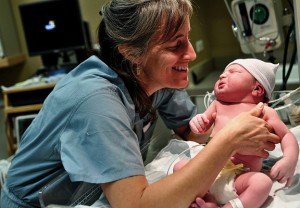 Your birth process is, perhaps, one of the most monumental experiences of your life. When it comes to making a decision about who will help facilitate your journey, it’s important that you weigh all the factors involved, and choose the type of care that best fits the unique needs of your body, personality and family.
Your birth process is, perhaps, one of the most monumental experiences of your life. When it comes to making a decision about who will help facilitate your journey, it’s important that you weigh all the factors involved, and choose the type of care that best fits the unique needs of your body, personality and family.
If you’re looking for more intimate and individualized care that seeks to limit intervention unless necessary, then a midwife is probably for you. Midwives work in private office settings (like the Full Circle Women’s Health Midwives), and attend births a hospital setting. Other midwives are part of a team of OB/GYNs. There are also homebirth midwives (like the Home Sweet Homebirth midwives at Full Circle) who provide prenatal care in an office setting or in your home. A midwife partners with you to make your unique care requests a reality.
A doula is a constant presence from early labor at home, transitioning with you to your chosen place of birth. A doula is not clinically responsible for you or the baby, but is familiar with birth and the various decisions that tend to arise. Think of the difference between a midwife and a doula as the difference between a server in a restaurant and a chef– the chef has the technical expertise and awareness of the process, and is ultimately responsible. The server, on the other hand, can describe and help with the process, but does not make the meal.
Below, we detail out specific details surrounding these two roles, so that you can discern how these two types of care may best compliment one another in order to meet your needs.
A Midwife:
A midwife specializes in clinical skills and judgment surrounding pregnancy and birth. Because she is an expert in birth, a midwife knows what to look out for in both the baby and mother. She sees signs that may indicate need for intervention, knows what to suggest to keep labor moving and is there to provide encouragement and wisdom when things are not going according to a mother’s birth hopes.
Whether or not a midwife is the best choice for you depends on your health history, your previous pregnancies and current medical conditions. For instance, if you are pregnant with twins or experiencing high blood pressure, you may want to pursue working with a hospital-based midwife that can co-manage your birth with a physician. We suggest speaking about your potential options to your primary caregiver, as well as a midwife team that you feel comfortable with!
Outside of birth, a Certified Midwife/ Certified Nurse-Midwife is also licensed to provide family planning, women’s primary health care, prenatal and birthing care and yearly gynecological exams and menopausal wellness care.
A Doula:
While they are not able to facilitate birthing themselves, registered doulas go through certification, training, and live births before providing care to patients. Their main purpose? Providing support and reassurance.
During your pregnancy, a doula works with you to create a birth plan and provide support for you and your partner. During labor, she can use natural techniques such as massage to help relieve discomfort, as well as facilitate different labor positions to help you through delivery. During postpartum, she helps nurture you as you care for your baby and supports your method of feeding the baby and your body’s healing process.
As you consider your birth journey, you may think of working with both midwives and doulas, as they are often are at their strongest when working together! For further information, we suggest reading this piece on the huge, positive impact doulas have on c-section rates, as well as this article on why women are choosing midwives for maternal care.
Questions, comments or something to add? We’d love to hear from you via Facebook, twitter or email!




